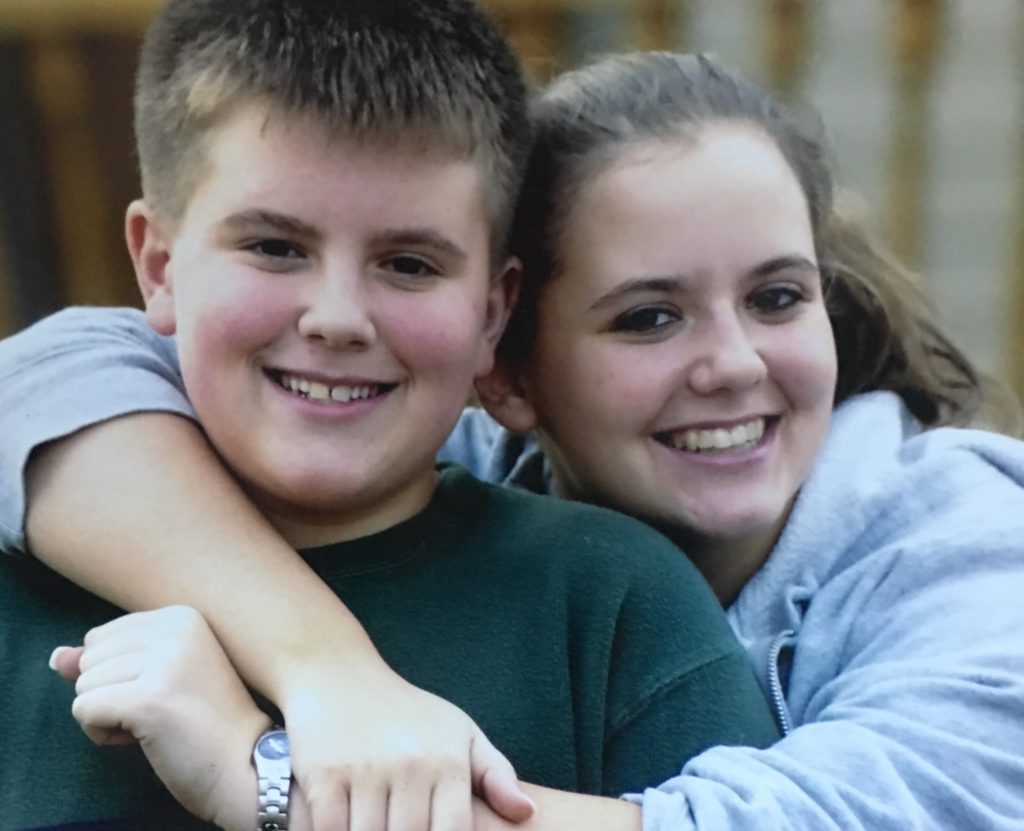Siblings Series: Carolyn Billetdeaux
Diabetes is a disease that affects the whole family. It’s not just the person who is receiving the injections or pump infusion sets or finger pricks who’s carrying the full weight of diabetes. It can be a balancing act for the people living with it, and the people living near it and caring for people with it.
At our Friends for Life conferences, we bring focus to the sibling experience, and we’re very excited to highlight some of their perspectives through our Siblings Series. Today we’re connected with Carolyn Billetdeaux about her experiences as the sister of a person with diabetes.
How old were you when your sibling was diagnosed with diabetes, and how did you find out about their diagnosis?
I was 10 years old when diabetes came into our lives. It was my first day of 6th grade, my brother’s first day of 4th grade. I came home from school to find an empty house and a note saying that my brother was sick, my parents were taking him to the emergency room, the doctor thought he had diabetes, my dad would be home later to come get me. It was terrifying not knowing what was going on.
I remember very distinctly that first conversation with my dad when he got home, while my mom stayed overnight with my brother in the hospital. I told him I was scared, and he said he was, too. It was the first time I had ever seen my dad cry. We were both just completely overwhelmed. I still tear up thinking about it. We all grew up a lot that day.

How has diabetes affected your life in a challenging way?
From the sibling perspective, I think the emotional toll of living with diabetes but not necessarily having it yourself is the most challenging, especially when you’re young. Navigating all the extra feelings that come with having a sibling with diabetes – things like helplessness, fear, anger, jealousy, sadness, loneliness – adds a pretty significant emotional burden.
It’s extra tough because, in addition to having all these feelings, you also feel this need to tone down or hide them for the sake of your family. You don’t want to create extra stress for your parents, and it’s not YOUR diabetes, so you don’t feel as entitled to have or share those feelings. It can even feel selfish to bring up your feelings, when it’s your sibling who has to deal with diabetes firsthand. The mentality of “I know I feel bad but I know what they’re going through is worse, so I shouldn’t say anything and should be brave and just suck it up” is very common.
Likewise with fear. If a diabetes scare happens in your family, you often find yourself on the sideline as your parents and T1D sibling react. You’re scared but there’s nothing you can do to help. Oftentimes siblings will hold onto that fear inside because they can see their parents and T1D sibling are already wound up and freaked out and don’t want to create more of a burden. You tend to hold things in, and it can feel like there’s no one to reach out to for help working through them.
This is one of the things we try to address through the Siblings programming track at FFL conferences – creating a safe space to feel and acknowledge these emotions and providing access to experts who can help siblings learn how to communicate and manage them in a healthy way.
How has diabetes influenced you in a positive way?
I think diabetes brought my family closer together. It made everyone more sensitive, more understanding, and more resilient.
Diabetes also brought me some of my best friends in the world! Through the FFL conferences, which I started attending when I was young, I met and grew up with a really incredible group of people who I’m still friends with today, 20 years later. Many of us are still involved in the FFL conferences as staff, leading programming for different age groups and bringing the experience to the next generation of families with T1D. It’s really rewarding, and we’re all really happy to continue giving back to a community that gave us so much.
I’ll also be the first one to say that the diabetes-related volunteer work I did in middle school and high school was one of the key factors in getting accepted to my dream college. Getting involved in diabetes advocacy and fundraising were fantastic extracurricular activities to include on things like college and scholarship applications. It’s a way to make a positive impact while also contributing to your own future. If you’re going to have to deal with the challenges of diabetes, you may as well go after the benefits, too!
What words of advice would you have for other siblings of people with diabetes?
Your feelings are valid. Speak up about them! It’s not selfish to take care of your feelings and emotional needs. Mental health is not a zero-sum game – everyone in the family is allowed to feel feelings about diabetes without detracting from the validity of the others’ feelings. You can grow even stronger as a family unit by sharing them and dealing with them together.
And, if you want to talk to other siblings who understand what you’re going through – come to FFL and join a session with our Sibs Team!
Why is support for siblings important to you? To our CWD community?
Having gone through the experience of growing up in a family with T1D, and having received some great support in navigating the emotions and challenges, it’s important to me to share these experiences and support other siblings. Sometimes, you just need to hear from somebody who has been there and who understands exactly what you’re going through. It helps normalize the emotions and lets you know that the things you are feeling are valid and that you are not alone.
I think the bottom line is that diabetes is a family disease. Though only one person in the family may have it, it still impacts everyone in different ways. Acknowledging that each family role has different emotional needs and providing access to a community of other people who have those same needs and experts who can help you deal with them is one of the things that CWD does best – be it the person with T1D, parents, siblings, children, friends, grandparents, or significant others. CWD provides knowledge and support for all.
Published: December 19, 2019


The CWD Editorial team is always hard at work to bring you the latest in diabetes research and news, as well as the info you need to live well with diabetes.
Do you have a story idea? Email us as [email protected]!
